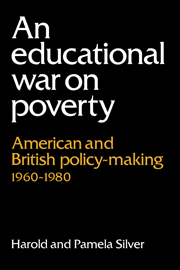Book contents
- Frontmatter
- Contents
- Acknowledgments
- List of abbreviations
- 1 Introduction: a proper complexity
- Part I A pattern of events: United States
- Part II A pattern of events: Britain
- 7 Advancing from poverty?
- 8 Opportunity, equality and social class
- 9 Sounds and silences
- 10 Plowden: direction finding
- 11 Plowden: making choices
- Part III Following through
- Interviews and consultation
- Bibliography
- Index
11 - Plowden: making choices
Published online by Cambridge University Press: 03 October 2009
- Frontmatter
- Contents
- Acknowledgments
- List of abbreviations
- 1 Introduction: a proper complexity
- Part I A pattern of events: United States
- Part II A pattern of events: Britain
- 7 Advancing from poverty?
- 8 Opportunity, equality and social class
- 9 Sounds and silences
- 10 Plowden: direction finding
- 11 Plowden: making choices
- Part III Following through
- Interviews and consultation
- Bibliography
- Index
Summary
The important aspects of the Plowden committee for us are the emphases we have seen emerging in the last chapter – contact with American ideas and practice in the war on poverty, and the elaboration of a strategy to combat the effects of poverty on education, not, as in the earlier concern with secondary education, to combat the injustices of social class with structural change. This approach to family and environmental poverty, ‘area’ solutions, preschool provision and the schools was to be carried into a variety of arenas not only as a direct result of the Plowden report, but also through the diverse agendas of debate and action it established. It would no longer be possible – as had been the case – for textbooks of the sociology of education to omit primary education, and discussion of educational priority areas in the report was to take educational research, policy and controversy in new directions.
The preoccupations of Working Party 2 and their drafting intentions became less sharp and explicit in the final report, though the basic intentions and proposals remained intact. Criticism of the report was to include a failure to take sufficient account of sociological factors, including particularly social class (B: Bernstein and Davies, 1969), and the over-reliance of the report and its commissioned research on the concept of ‘parental attitude’. What has not been fully understood, however, is that the working party and committee deliberately chose poverty and related concepts as a more immediate and policy-productive context for the discussion of primary schools in deprived areas.
- Type
- Chapter
- Information
- An Educational War on PovertyAmerican and British Policy-making 1960–1980, pp. 236 - 254Publisher: Cambridge University PressPrint publication year: 1991



